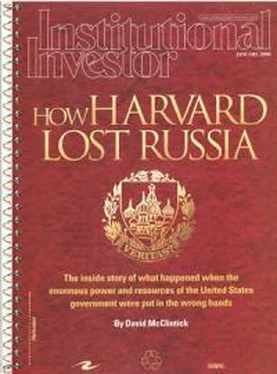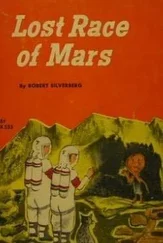The Gaidar group formulated a set of principles that they believed must guide the reform. First, all Russian citizens should have the right to own private property. Second, ownership of property, as well as other components of a free economy, such as stock and bond trading, should be governed by codes of law.
On November 1, 1991, Yeltsin named Gaidar deputy prime minister and minister of Economics and Finance. Gaidar summoned St. Petersburgbased economist Anatoly Chubais, then 36, who sped to Moscow. Chubais in turn telephoned an even younger St. Petersburg economist, 29-year-old Dmitri Vasiliev. Could Vasiliev write a two-page program for mass privatization of all of the property and assets in Russia? And could he write it fast? Vasiliev could, and did, and rushed the memorandum to Moscow.
Only a few years earlier, Chubais, a tall strawberry blond who liked fast cars, and Vasiliev, a diminutive, politically savvy, bespectacled intellectual who resembled Woody Allen, had been plotting the privatization of the Soviet economy as part of a group of young dissident economists at the universities of Leningrad and Moscow, hiding their activities out of fear of the KGB. During the final days of Gorbachev, they had advised the government of Leningrad, soon to regain its original name, St. Petersburg, on economic reforms.
In the Moscow of November 1991, the team faced a different fear -- of the dire consequences of failure. "Russia was facing the largest and most complex privatization process in the history of humankind . . . and the absence of any legal base for its development," Gaidar would later write in Days of Defeat and Victory . He dubbed his group "the kamikaze team."
The team did have some models. Though discarded, the 500 Days plan remained a focus of public discourse. And there was the example of Poland, which had been experimenting with capitalism since the late 1980s.
The man who had guided Poland's economic reform, Jeffrey Sachs, an economics professor at Harvard University, was a boyish-looking 35-year-old with explosive energy and little patience. An economic wunderkind, Sachs had passed the general examinations for his Ph.D. and was invited to join the rarefied Harvard Society of Fellows while he was still a Harvard undergraduate. He won tenure in the department of economics at age 29.
Sachs had begun advising the Polish Solidarity Movement before it took control of the government in August 1989. He invited another Harvard-trained economist, David Lipton, to work with him. Lipton, who had been Sachs' student, had spent most of the 1980s at the International Monetary Fund. On January 1, 1990, following Sachs' and Lipton's advice, the Polish government introduced what came to be known as "shock therapy" -- the rapid conversion of all property and assets from public to private ownership. After initial shortages and inflation, goods and services soon were flowing through the economy in unprecedented varieties and quantities; prices stabilized.
Though envious of Poland's success, Russian reformers knew their task would be much more difficult. "When socialism collapsed in Poland, an entire generation of people still remembered what markets, market institutions and private ownership were," Gaidar wrote in State and Evolution: Russia's Search for a Free Market , published in 2003. "In Russia there was no such experience to be had. In 1991 the vast majority of Russian citizens had never seen a normal retail shop."
Still, the Polish experiment was getting worldwide publicity, and it wasn't long before Moscow reached out to Sachs, who began formally advising the Russians in late 1991, simultaneously with the official dissolution of the Soviet Union. In November, Gaidar invited Sachs and Lipton to work with the new economic team.
Moscow by then was crowded with foreigners eager to help Russia and get in on the ground floor of a great social and economic change. Entrepreneurs, consultants, lawyers, bankers and academics with foundation grants, as well as fast-buck artists and swindlers from all over the world, swarmed across Russia looking for a piece of the action. The atmosphere was charged with possibility and fraught with danger. Financial transactions were mostly conducted in cash; cities were awash in rubles. Kidnappings were common, as was gunfire and even bombings. Organized crime darkened the already grim picture.
Russia's leaders felt a near-apocalyptic sense of urgency. They understood that to prevent chaos they had to quickly lay the foundation for a Russian-style capitalism or face a return to authoritarianism couched as a restoration of law and order. Even as Yeltsin's reformers got to work, they faced strong opposition from reactionary former Communists who protested the speed and cost of change.
Sachs wasn't the only Harvard professor in Moscow in the summer and fall of 1991. No fewer than four university affiliates -- the John F. Kennedy School of Government, the Russian Research Center, HIID and the economics department -- were represented. Graham Allison, the founding dean of the Kennedy School, was pushing an updated version of the 500 Days plan with its co-author, liberal economist Grigory Yavlinsky. Marshall Goldman, the director of Harvard's venerable Russian Research Center and a frequent visitor to the Soviet Union for decades, was providing counsel to various parties. Sachs, thanks to his experience in Poland, emerged as the leading figure among these notables. In Moscow he encountered yet another Harvard colleague, Andrei Shleifer. Shleifer had been sent to Moscow by the World Bank, where Summers, on leave from Harvard, was serving as chief economist. Shleifer possessed a distinct advantage over other Westerners: He was a native of Russia and fluent in the language, having been born there in 1961. His parents were engineers, a profession the state chose for them. Shleifer revealed at an early age that he was ambitious; in a photograph taken when he was six, he is dressed as a Soviet Army general. When a friend transferred to one of the best schools in Moscow, Shleifer bicycled there and didn't leave until he had persuaded the principal to admit him as well.
The Shleifers left Russia in 1976 with the help of the Hebrew Immigrant Aid Society and moved to Rochester, New York. Andrei later claimed he learned most of his English by watching the popular television show Charlie's Angels . He excelled in mathematics and was admitted to Harvard College. In his sophomore year he went to see Summers and pointed out errors in a paper the young assistant professor had written. Summers, the nephew of two Nobel laureates in economics, soon took Shleifer under his wing. Like Sachs, Summers was one of the youngest economists ever granted tenure by Harvard -- they had made it the same year. Summers guided Shleifer onto a similar path, and the friends maintained their close relationship after Summers went to the World Bank in 1991.
There was no love lost between Sachs and Summers, who had been rivals as newly tenured prodigies. Each had to be the smartest man in the room; their presence at faculty meetings ensured lively debate tinged with animosity. Shleifer had a similar personality, and when the confident upstart encountered Sachs in Moscow, he didn't get along any better with Sachs than his mentor did.
Nonetheless, Sachs introduced Shleifer around the Russian government. It was decided that Shleifer would work with Chubais and Vasiliev on privatization while Sachs advised Gaidar on macroeconomic issues.
Gaidar appointed Chubais to head a new government agency, the State Committee on the Management of State Property. Known by its Russia acronym, GKI, it had no office or charter, except the vague commission to "privatize" the economy and Vasiliev's two-page outline recommending Polish-style shock therapy.
The daunting task was further complicated by the fact that a portion of the economy -- nobody knew how much -- had already been privatized in a de facto sense: In the confusion of perestroika, Gorbachev's mid-1980s effort to restructure the economy to make communism more efficient, a number of senior government bureaucrats, managers of state-owned factories and farms, had been allowed to quietly transfer public assets to themselves and their families. Some of these transfers verged on "theft and embezzlement," Gaidar acknowledged in State and Evolution , but it was too late to reverse them, and the real problem, he allowed, "has been the system itself; complete ambiguity around property rights, absolute lack of accountability." This would have to be changed with new legal codes.
Читать дальше






![Джонатан Димблби - Barbarossa - How Hitler Lost the War [calibre]](/books/385421/dzhonatan-dimblbi-barbarossa-how-hitler-lost-the-w-thumb.webp)





